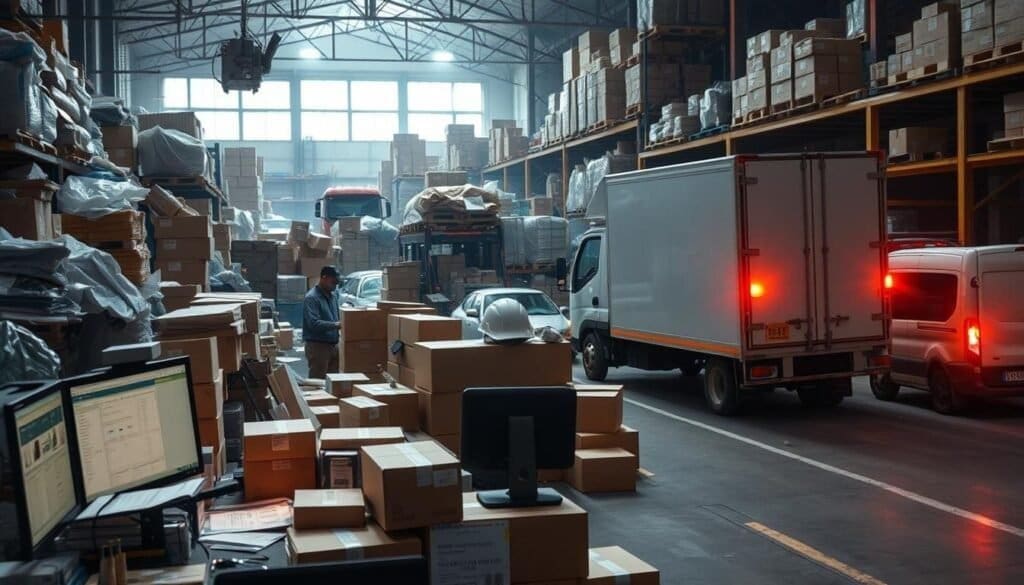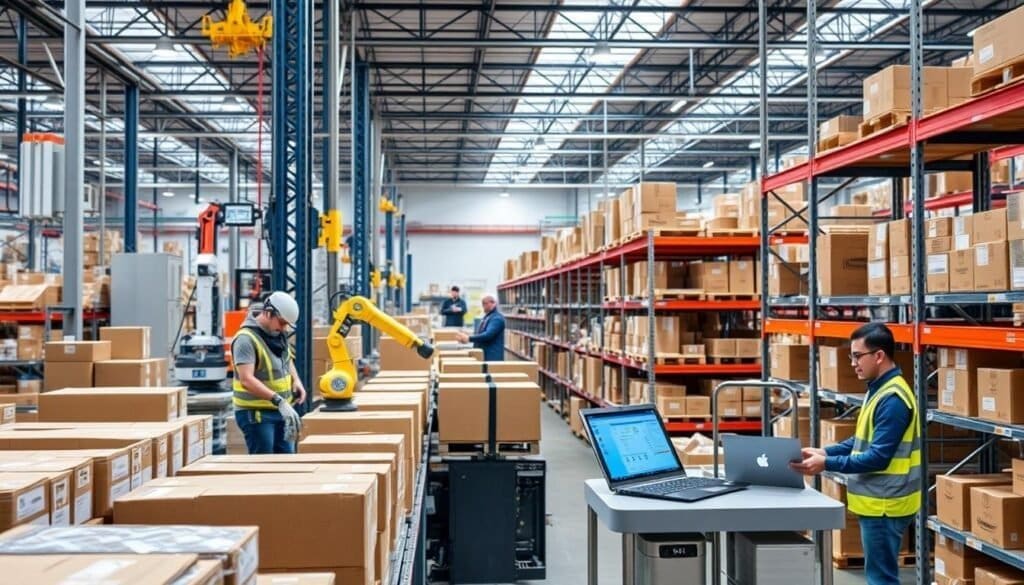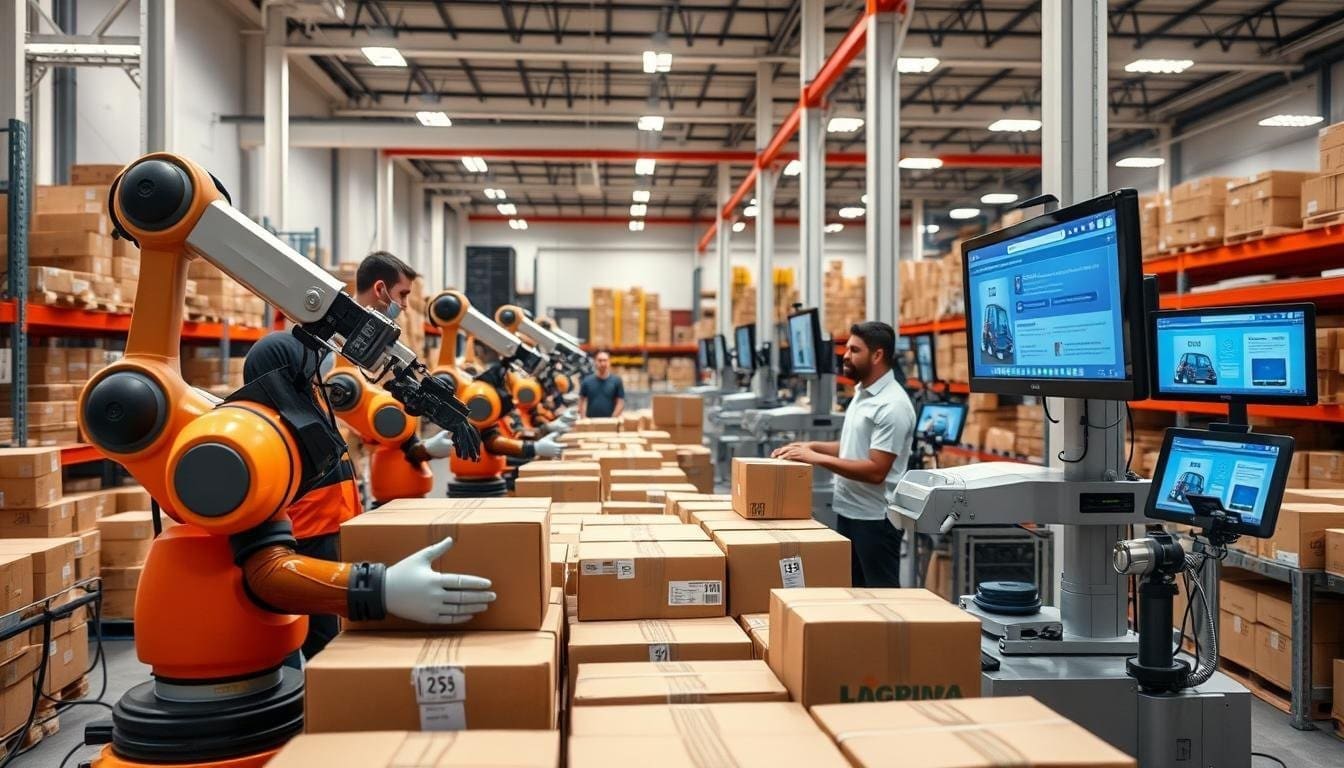Scaling my small business means focusing on efficient shipping automation. The digital trade world is changing fast. Today's shoppers expect quick updates on their orders, with over 68% wanting timely notifications and over 45% expecting delivery updates12. This guide will help you automate shipping to boost efficiency, cut costs, and make customers happier.
Many small businesses are using shipping automation tools like ShipStation. It works for all sizes, from 25 to over 7,500 shipments a month1. By using these tools, you can improve your service and keep up with big names like Amazon2. We'll explore the key steps and considerations for effective shipping automation in e-commerce.
Key Takeaways
- Efficient shipping processes are critical for customer satisfaction.
- Automation tools can greatly reduce shipping errors.
- Many consumers expect clear updates on their orders.
- Aligning shipping automation with consumer insights can boost sales.
- Choosing the right tools is key based on your shipping needs and volume.
- Embracing technology helps small businesses compete with big retailers.
The Importance of Efficient Shipping in E-commerce
Efficient shipping is key in e-commerce, not just a need. It's essential for meeting customer expectations in a competitive market. High shipping costs cause 69.57% of shoppers to leave their carts empty3. This shows how important fast and reliable shipping is for keeping customers.
89% of customers will buy from a company again if they have a good experience3. Using automated shipping can meet these expectations. It ensures accurate inventory and keeps customers happy.
Understanding Customer Expectations
Today's shoppers want fast and easy online shopping. Automation makes orders quicker, with alerts for low stock and fast label printing4. Companies must meet these expectations to keep customers.
Ignoring what customers want can lead to losing them. Efficient shipping helps keep customers loyal and stops them from leaving.
The Impact on Customer Satisfaction and Retention
Good shipping solutions are key to happy customers. For example, accurate inventory management stops 60% of stock issues3. Automated shipping means orders are processed fast, making customers happy4.
Burrow shows how important it is with easy tracking and smooth shipping. This makes customers want to stay5.
Market Statistics Influencing Shipping Automation
The world of online shopping is changing fast. Small businesses need to keep up. The Global Shipping Software Market is expected to grow by 12% from 2024 to 20306. This shows how much technology is becoming key in logistics.
A big 45% of shoppers want updates on their deliveries in real-time7. This shows how important shipping updates are for happy customers. The shipping software market was worth USD 101 million in 2023. It's expected to hit nearly USD 195 million by 20306. Businesses must quickly adapt to these changes.
North America and Europe lead in the shipping software market. They seek efficient solutions to meet growing demands. Automation can help with rising costs and supply chain issues8. It helps small businesses run smoother, save money, and make customers happier with timely updates.
Trends in Online Shopping
Online shopping trends show people want easy shipping solutions. E-commerce growth means a need for better shipping automation6. Consumers expect fast and reliable delivery. Small businesses must use automation to keep up with these changes.
Consumer Preferences for Shipping Notification
Today, people want more than just their packages. They want updates and engagement during shipping7. Good shipping updates can make customers happy and keep them coming back.
Automation lets businesses send timely updates on orders. This makes shopping better and builds loyalty.
| Year | Market Value (USD Million) | CAGR (%) |
|---|---|---|
| 2023 | 101 | – |
| 2028 | 194.89 | 12 |
Benefits of Automating Your Shipping Process
Automating my shipping process has changed how I run my business. It uses technology to bring big shipping automation benefits. These benefits make my business more efficient and happy customers.
Reducing Human Error
One big plus is less human error. Tools like Veeqo work with big names like Amazon and Etsy. They help small businesses manage shipping and stock better, cutting down on mistakes9.
Not having to handle shipping labels by hand is key, even more so when orders pile up10. It makes things more accurate and saves a lot of time and money. This lets me grow my business faster.
Improving Order Fulfillment Speed
Order fulfillment speed is key in today's online shopping world. Automation lets me handle up to 100 orders at once, meeting fast customer demands9. Systems like automated picking and packing make things faster and more accurate9.
Using barcode scanning and real-time tracking keeps my stock levels right. This means I avoid running out of stock and keep customers happy9. Automating shipping helps me meet fast delivery expectations and grow my business.
| Benefit | Description |
|---|---|
| Reduced Errors | Automation minimizes mistakes in shipping processes, making things more accurate. |
| Faster Fulfillment | Being able to handle many orders quickly means faster delivery times. |
| Cost Efficiency | Automation saves money by reducing the need for more staff. |
| Scalability | Automated systems handle more orders easily, supporting business growth. |
How Do Shipping Automation Tools Work?
Shipping automation tools change the game in logistics. They bring together different functions to make things more efficient. They focus on order processing, helping businesses work better and cut down on mistakes.
This leads to fewer delays and happier customers.
Order Processing Automation
Order processing automation is a big deal in these tools. It gets rid of manual data entry, making order processing quicker and more accurate. With 95% of online shoppers expecting quick issue resolution11, this is key.
Automated systems handle lots of orders fast, letting businesses grow. They also make tracking orders and managing stock better, which keeps customers happy and operations running smoothly12.
Label Generation and Package Tracking
Label generation and tracking are also important in these tools. They make creating shipping labels easy and cut down on mistakes. Real-time tracking adds to the transparency, which is a big plus for over 70% of online shoppers who value convenience11.
Automated tracking also means less room for human error, making inventory management and demand forecasting better1213. This helps businesses meet market needs and give customers a smooth experience.
Identifying Your Shipping Challenges
Before I automate my shipping, I must find out what's holding me back. Small businesses often face issues like manual data entry and slow processing. Knowing these problems is key to a smooth transition to automation.
Pain Points in Current Shipping Processes
One big challenge is high shipping costs. Small businesses like mine find it hard to get good rates. Even small price hikes can hurt our budget a lot14.
My current systems lack automation, making order and shipment management a hassle14. Tasks like entering order details and tracking shipments are slow and inefficient.
I also face issues with limited resources. I don't have enough staff or the right equipment for safe packaging and shipping. Without reliable transport, meeting customer needs quickly is tough14. Courier services might not want to work with small businesses because of capacity issues.
Time is another big factor. I need to pick up orders fast and deliver them on time. But, without the right transport, I struggle to meet deadlines. Customers want reliable shipping and to be able to track their orders, which builds trust14.
Assessing Order Volume Needs
To pick the right shipping automation, I must look at my current and future order volumes. In July 2023, only 64.2% of container ships arrived on time, showing the need for good shipping plans15. Also, 58% of customers stop buying after three shipping delays, so I must fix these problems quickly15.
Understanding these points helps me choose the right automation for my business size. Automation can solve many shipping problems, like improving order tracking. This way, I can promise my customers their orders will arrive on time and in good shape. Better packaging that meets carrier standards also helps avoid damage during shipping, keeping customers happy.

How to Automate Shipping for Small Businesses
Automating shipping is a big win for small businesses. It makes operations more efficient and improves how orders are filled. A helpful resource is this guide, full of useful tips.
There are many shipping software options out there. They can save up to 88% on shipping costs with carriers like UPS and USPS16. This lets me compare prices and pick the best deal for my business. Tools like ShippingEasy and Shippo make tracking orders and managing inventory easy. They also offer discounted rates and customizable notifications17.
Also, over 45% of online shoppers want updates when their packages arrive17. Using automation helps keep customers happy. It ensures they get updates on their shipments, making them more likely to buy again.
In short, the right software and processes can make a big difference for small businesses. As I automate my shipping, it's key to involve employees and support tech integration. Using data for improvement keeps our shipping solutions efficient and focused on the customer.
Selecting the Right Shipping Automation Software
Choosing the right shipping automation software is key for small to medium-sized businesses. I look for software that fits well with what we already use. Businesses need to think about their shipping needs, like which carriers to use and how far they ship.
Integration with Existing Tech Stacks
Compatibility is key when it comes to software integration. Many shipping software solutions work well with popular e-commerce platforms and management systems. This makes it easier to manage orders and track shipments.
Statistics show that shipping software can save businesses time and money. It can also limit what features you can use, depending on the platform18.
Evaluating Shipping Requirements
It's important to understand what shipping software can do for you. In 2024, top choices include ShippingEasy, ShipStation, and Veeqo19. Each offers different pricing based on your shipping needs.
Look for features like automation rules and order tracking. Knowing your current and future needs helps choose software that grows with your business18.
Key Features to Look for in Shipping Automation Software
When looking at shipping automation software, certain features are key. They help streamline your business and make sure your customers have a smooth experience. Important features include real-time carrier pricing and efficient label creation. These help lower shipping costs and make your service more reliable.
Real-time Carrier Pricing
Real-time carrier pricing is vital for saving on shipping costs. It lets you quickly compare different shipping options. This way, you can pick the best deal for each order.
Shipping costs are a big part of order fulfillment expenses, making accurate pricing essential20. Businesses shipping 50 or more packages daily can save a lot by using automated pricing tools21.
Label Creation and Printing Efficiency
Efficient label creation is also key. Many businesses want customizable labels with their logos21. Automated label generation speeds up the process and cuts down on mistakes.
This makes shipping smoother. It also helps follow safety and regulatory rules when shipping hazardous materials21.
| Feature | Description | Benefits |
|---|---|---|
| Real-time Carrier Pricing | Instant comparison of shipping costs across carriers. | Optimizes shipping decisions and reduces costs. |
| Label Creation | Automated generation of customizable shipping labels. | Minimizes errors and improves branding opportunities. |
| Package Tracking | Provides real-time updates to customers about their shipments. | Enhances customer satisfaction and trust in the delivery process. |
| Compliance Automation | Ensures shipping complies with safety and regulatory standards. | Reduces legal risks when handling hazardous materials. |
Step-by-Step Guide to Implementing Automated Shipping
Exploring automated shipping for small businesses is key. This guide will help you pick the right tools, integrate them, and test your workflow. This ensures a smooth transition to automated shipping.
Choosing Necessary Automation Tools
Finding the right automation tools is essential. Look for tools that work well with popular e-commerce sites like Shopify or BigCommerce. These tools make it easy to switch from manual to automated shipping.
Using well-known carriers like USPS, UPS, and FedEx is also smart. They are trusted by many customers22. Plus, tools that let you manage templates easily are a big plus22.
Testing the Automated Workflow
After picking your tools, it's time to test your workflow. This step makes sure everything works right. You'll test the whole order process from start to finish.
Working with third-party logistics can give you valuable insights23. It helps with inventory and order fulfillment. Testing well lets you fix any issues before going live.
Automating your shipping can make your business more efficient and save money. It also makes customers happier. Starting your automation journey can really improve your operations.
How Shipping Automation Can Boost Your Business
Shipping automation changes how I handle fulfillment and improve customer service. It makes fulfillment faster, leading to quicker deliveries and happy customers. Automated shipping lets me focus on other important business areas.
Streamlining Fulfillment Processes
Shipping automation makes complex fulfillment tasks easier. Automated systems handle tasks like setting up shipments and assigning orders. This saves time and money, letting me grow my business24.
I can also use data to target customers better, making my service more effective25. This means fewer mistakes and happier customers24.
Enhancing Customer Experience
Shipping automation makes customer service better. It makes my service consistent and reliable, building loyalty25. Customers like fast and accurate deliveries, which keeps them coming back.
Automation helps me offer personalized experiences, leading to more repeat business and positive feedback25. It helps my business grow while saving money, keeping me competitive in e-commerce24.

Costs Involved in Automating Shipping
It's important to know the costs of automating shipping to make a good budget. I'll look at shipping rates, software costs, and how these can save money. This is key for efficient shipping solutions.
Understanding Shipping Rates and Fees
Shipping fees are a big part of shipping automation costs. Over 73% of online shoppers want fast and affordable delivery. This means businesses must find ways to save on shipping26.
Shipping zones in the US affect rates. Using dimensional weight for shipping can change freight charges. This impacts my budget26.
Budgeting for Automation Software
Software for shipping automation can be expensive but worth it. The cost to improve picking can be $500,000 to $1 million27. More advanced systems can cost $1 million to $5 million.
Even more, a “dark warehouse” setup might need about $25 million27. It's important to think about the return on investment. Automation can make processes smoother and lower shipping costs by up to 50% with hybrid services26.
Real-World Examples of Successful Shipping Automation
Learning from small businesses that use shipping automation is very helpful. It shows us the good and the bad, and how to do it right. Through case studies, we see what works and what doesn't.
Case Studies from Small Businesses
A small retail company used ShipStation to make shipping easier. They could send out 50 to over 10,000 orders a month28. This saved them a lot of time and effort.
A food delivery service also made big changes. They saved 40-80% by using new technology. They also used data to make sure their shipping was accurate29.
Lessons Learned from Implementation
These stories teach us that cutting down on mistakes is key. About 80% of shipping problems come from human errors. Automation helps fix this, making things better for everyone29.
Fast delivery is also important. 41% of people want their stuff in 24 hours. This pushes businesses to work faster. The logistics industry is growing fast, showing the need for good shipping29.
| Business Type | Automation Technology Used | Key Outcome |
|---|---|---|
| Retail Company | ShipStation | Increased efficiency, reducing manual tasks |
| Food Delivery Service | Micro-fulfillment Technology | 40-80% savings achieved |
Common Misconceptions about Shipping Automation
Many people think shipping automation is too hard to use. But, modern tools are made to be easy. They have features like drag-and-drop interfaces. This makes it simple for businesses to start using automation.
Addressing Fears of Complexity
Small business owners worry about the complexity of shipping automation. But, only a small part of jobs can be fully automated31. This means automation is meant to help, not replace everything. It can make routine tasks easier and free up time for important work.
Understanding Maintenance and Support Needs
Some think shipping automation needs a lot of upkeep. But, the costs are not too high. You can get started for as little as $19.99 a month30. This makes it affordable for small businesses to improve their operations.
Also, the support from automation software helps businesses overcome any issues. This keeps things running smoothly.
Future Trends in Shipping Automation
The shipping industry is changing fast, thanks to new technologies. Artificial intelligence and machine learning are making things more efficient. They're changing how we work.
More companies are spending money on supply chain tech, with 74% investing more. This means we're seeing less manual work and more accurate processes32.
Emerging Technologies to Watch
New tech is set to change how we do logistics and shipping. By 2025, over 4 million commercial robots will be in warehouses32. The global market for warehouse automation is expected to grow a lot, from $21.7 billion in 2021 to $93 billion by 203133.
This growth shows a big push for robotics and AI. They can make things run smoother and save money34.
Shifts in Consumer Shipping Expectations
What customers want is also changing shipping. For example, 65% of shoppers want shipping insurance at checkout. This shows they want more protection32.
As customers' needs grow, so does the need for innovation in supply chains. 96% of leaders see innovation as key to growth32. Businesses need to keep up with these changes to succeed.
Conclusion
My journey to automate shipping for small businesses has shown it's key for success today. By using automated solutions, I can make my operations better. This leads to happier customers and helps my business grow.
It's important to note that 36% of online shoppers leave because of shipping costs. This shows how vital it is to make my shipping process smooth. This way, I can keep my customers coming back35.
Using affordable and reusable shipping supplies helps cut costs. This keeps me competitive. Automating shipping saves time and effort, which is important for today's fast-paced consumers36.
With partners like USPS for domestic and DHL Express for international, I can grow my services. This makes me confident in expanding my offerings.
Seeing shipping automation as a long-term investment is wise. It gives me real-time tracking and quick customer service. As I wrap up my shipping automation journey, I'm eager to keep improving my small business shipping. This will add value and sustainability for my customers3536.
FAQ
What is shipping automation for small businesses?
How can automating shipping reduce costs?
What are common challenges faced in shipping that automation can solve?
How do I choose the right shipping automation software?
What features should I look for in shipping automation tools?
Are there any upfront costs associated with implementing shipping automation?
What are some real-world benefits of automated shipping?
How can I ensure a smooth transition to automated shipping?
What misconceptions exist about shipping automation?
What future trends should I be aware of in shipping automation?
Source Links
- 8 Best Shipping Software Platforms for Small Businesses – https://www.routific.com/blog/best-shipping-software
- Small Business Shipping Tips: The Next Steps After The Sale (2020) | BigCommerce – https://www.bigcommerce.com/blog/small-business-shipping-tips/
- How to Use Automated Shipping + Ecommerce (2022) | BigCommerce – https://www.bigcommerce.com/blog/automated-shipping-ecommerce/
- 4 Benefits of Automated Shipping and How You Can Automate – https://www.sherpack.com/4-benefits-of-automated-shipping-how-to-automate-your-ecommerce-shipping/
- How medium and large e-commerce businesses can ensure consistency and efficiency in shipping – https://www.retaildive.com/spons/how-medium-and-large-e-commerce-businesses-can-ensure-consistency-and-effic/726387/
- Shipping Software Market Surges to USD 194.89 Million by 2030, Propelled by 12% CAGR – Verified Market Reports® – https://finance.yahoo.com/news/shipping-software-market-surges-usd-143000795.html
- Logistics Automation Market Size, Share, Statistics, Drivers & Opportunities – https://www.marketsandmarkets.com/Market-Reports/logistics-automation-market-83657139.html
- 7 Ways Automation Reduces Transportation Costs – https://www.transvirtual.com/blog/7-ways-automation-reduces-transportation-costs/
- 7 Ways to automate the shipping process – https://www.veeqo.com/blog/automate-shipping-process
- How to Scale Your Business with Shipping Automation – https://www.brightpearl.com/blog/how-to-scale-your-business-with-shipping-automation
- Mastering Shipping Automation: A Comprehensive Guide For eCommerce Businesses – https://www.sparkshipping.com/blog/shipping-automation
- Automated Shipping: Benefits + How It Works – https://www.shipbob.com/blog/automated-shipping/
- The Role of Automation in Streamlining Shipping and Packaging Processes – WareSpace – https://warespace.com/articles/shipping-and-packaging-insights/shipping-packaging-automation
- Small Business Shipping Challenges: Here’s How You Can Solve Them – https://www.transportify.com.ph/delivery/business/small-business-shipping-challenges-heres-how-you-can-solve-them/
- 9 Common Shipping Issues and Problems and How to Deal With Them (2024) – Shopify – https://www.shopify.com/blog/122517253-most-common-shipping-problems
- Shipping Software for Ecommerce Fulfillment – https://www.shipstation.com/
- 10 Best Shipping Software for Delivery Businesses (According to Users) – https://elogii.com/blog/best-shipping-software
- Choosing the Best Shipping Software for Your Business – https://shiprush.com/blog/shipping-tips/best-business-shipping-software/
- 15 Best Shipping Software for eCommerce Businesses in 2024 – https://influencermarketinghub.com/best-shipping-software-ecommerce/
- Top Shipping Software for Ecommerce Businesses – https://www.inboxarmy.com/blog/shipping-software-for-ecommerce-businesses/
- Best Shipping Software Features | DigitalShipper – https://www.digitalshipper.com/features
- Automate shipping templates in Walmart Marketplace – https://marketplacelearn.walmart.com/guides/Shipping & fulfillment/Shipping Templates/Shipping-templates:-Automate-settings
- Shipping Process – https://www.shipbob.com/ecommerce-shipping/process/
- How Can Automated Shipping Boost your eCommerce Business [2022] – https://nimbuspost.com/blog/how-can-automated-shipping-boost-your-ecommerce-business/
- How shipping automation helps ecommerce businesses scale profitably – https://prestashop.com/blog/logistics/how-shipping-automation-helps-ecommerce-businesses-scale-profitably/
- Ecommerce Shipping – https://www.shipbob.com/ecommerce-shipping/
- How Much Can Warehouse Automation Cost Your Business? – https://shiphero.com/blog/article/warehouse-automation-cost/
- 12 Best Shipping Software for eCommerce in 2024 – https://neklo.com/blog/best-shipping-software-for-ecommerce
- Micro-Fulfilment: In-Depth Guide + 7 Real Examples For 2024 – https://www.dropoff.com/blog/micro-fulfillment/
- Debunking Myths & Misconceptions of Automated Solutions – https://www.srs-i.com/debunking-myths-misconceptions-of-automated-solutions/
- Automation’s Role in E-Commerce and Shipping – https://www.sdcexec.com/software-technology/automation/article/21940885/linnworks-automations-role-in-ecommerce-and-shipping
- Shipping Automation: How It Works + Benefits – Creative Logistics Solutions – https://creativelogistics.com/shipping-automation-how-it-works-benefits/
- This Year's Top 5 Trends in Automation – https://blog.tompkinsrobotics.com/this-years-top-trends-in-automation
- Shipping Automation: Everything You Need to Know 2023 – https://dfreight.org/blog/shipping-automation-everything-you-need-to-know/
- Small Business Shipping Tips: A Guide to Make Your Shipping Cheaper and Easier – https://sellbery.com/blog/small-business-shipping-tips-a-guide-to-make-your-shipping-cheaper-and-easier/
- How to Use Automated Shipping + eCommerce (2024) – https://www.clickpost.ai/blog/automated-shipping





